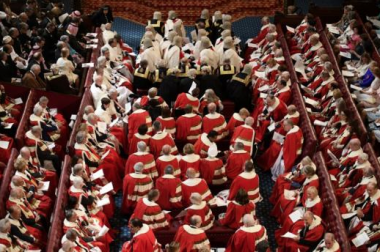Bishop of Worcester defends Church of England against push for disestablishment

The Bishop of Worcester has defended the continued establishment of the Church of England against calls for Britain to become a secular state.
Speaking in the House of Lords on Wednesday, Lord Berkeley said future monarchs should swear an oath to Parliament instead of making a vow to protect the Church of England, as the Queen did at her coronation in 1953.
The Labour peer argued that it was time for change as the number of people attending the Church of England continues to fall while those with no religion rises.
He suggested that a secular oath would better reflect the 'different backgrounds' in modern day Britain.
'Is it not time for the new monarch, when he comes, to embrace this secular state and perhaps swear an oath to Parliament,' he said.
The call for a secular oath was made in a recent report by the UCL Constitution Unit. The report suggested that references to protecting the Church of England be removed from Prince Charles' coronation service and that he instead make an 'oath to the people'.
Voicing his support for the UCL report's findings, Lord Berkeley said: 'Is that not the way we should be heading?'
He asked what assessment the Government had made of the case for the disestablishment of the Church of England.
In reply, Lord Young of Cookham said the Government had not made any assessment towards disestablishing the Church of England and that the Government continued to 'value that relationship'.
'We think it adds value to both sides and is welcomed by the country. We have no plans to destabilise that relationship,' he said.
Lord Young said it was 'important' that the bishops continue to be represented in the House of Lords because 'they add a spiritual dimension to our discussions' and 'speak with a moral authority that escapes most of us'.
'The bishops seek to heal religious conflict and promote religious tolerance and inclusiveness,' the Tory peer continued.
He added: 'It would be sad if that link between Church and state was weakened, and it is not something the other faiths have asked for.'
In his contribution to the debate, the Bishop of Worcester, the Rt Rev Dr John Inge, said that the Church of England was a 'significant force for good' and played an important role in bringing people of all faiths and none together.
'When the country came together to commemorate the 100th anniversary of the Armistice earlier this month, the Church of England led events of solemn remembrance and thanksgiving in pretty much every community up and down the land of England,' he said.
'The convening power of the Church in bringing together people of different faiths and none is a central feature of its established status that is greatly valued by those of other faiths, who appreciate such a hospitable establishment.'
Labour peer Lord Winston also spoke in favour of establishment, saying that the Church of England was 'hugely important to the nature of this country and in this House as well'.
'Indeed, it is one of the reasons why I am proud to be British,' he said.











